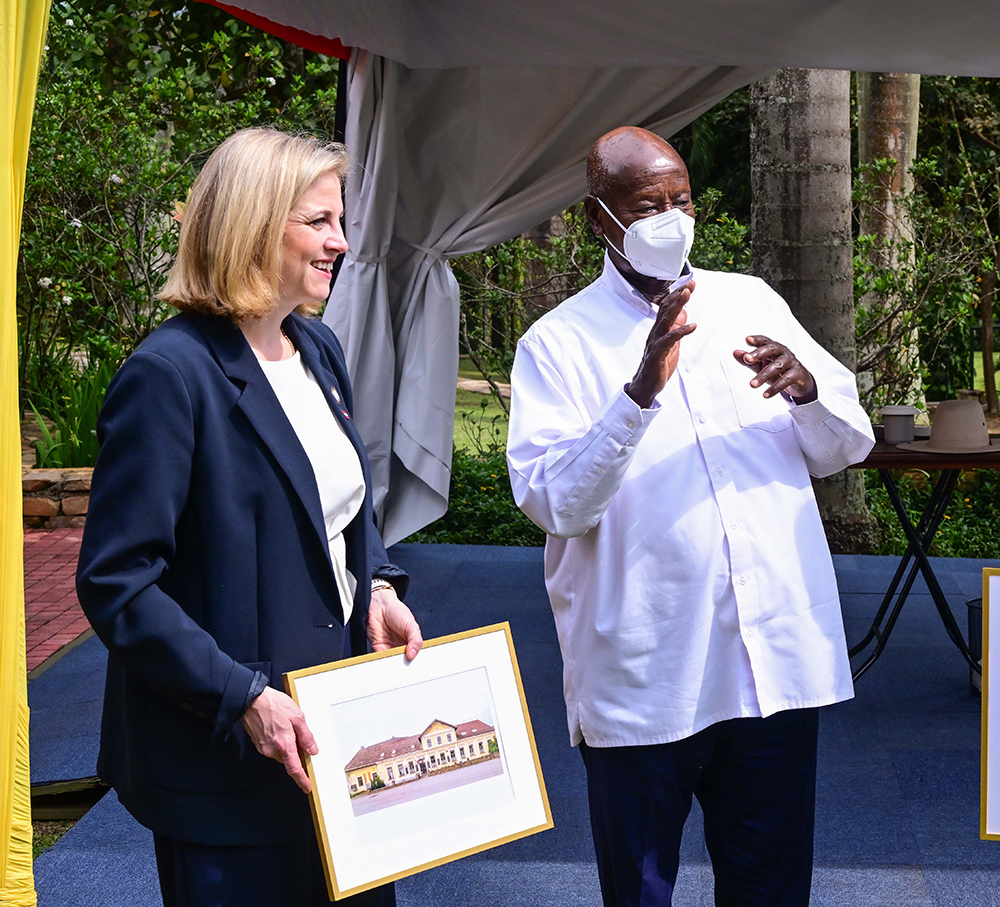Museveni urges Europe to invest more in Africa for shared prosperity
The President emphasised that Africa presents vast untapped opportunities that Europe continues to overlook.
Austria's Foreign Affairs Minister Beate Meinl-Reisinger (3rd L) and her delegation pose for a photo with PresidentYoweri Kaguta Museveni on the sidelines of the NAM Ministerial meeting at Speke Resort Munyonyo. (PPU photos)
________________
President Yoweri Kaguta Museveni has called on European countries to take advantage of their proximity to Africa and increase investments on the continent for mutual economic growth and prosperity.
Speaking on Wednesday, October 15, 2025, while meeting a high-level Austrian delegation on the sidelines of the ongoing 19th Ministerial Meeting of the Coordinating Bureau of the Non-Aligned Movement (NAM) at Speke Resort Munyonyo in Kampala, the President emphasised that Africa presents vast untapped opportunities that Europe continues to overlook.
“I feel sorry that Europeans are our relatives, speaking English like me because I don’t speak Russian, but the Europeans have not been taking advantage of that, and yet they are also near Africa. They are not far away,” President Museveni remarked.
He jokingly added that “some of the European countries should be members of the African Union,” given their historical and cultural connections to the continent.
“But somehow, they have neglected the opportunities in Africa, including business investment,” he said.
President Museveni contrasted Europe’s hesitation with China’s growing engagement in Africa, noting that “When you see the Chinese come here and they are really doing great work, you wonder why our European people are totally sleeping.”
The President reiterated that Uganda and Africa at large were ready to welcome more European investors.
“We have a lot of linkages - many Africans now speak English, some speak Portuguese, and many of them are Christians - so we have cultural and historical bonds that make collaboration easier,” he said.
President Museveni further highlighted Africa’s enormous potential in terms of both population and resources.
“Africa is 12 times the size of India. You can fit India into Africa 12 times, but you people who left multiplied more than those who stayed,” he said.
He explained that Africa’s demographic transformation now gives it a unique advantage.
“Until recently, the population of India was bigger than the population of the whole of Africa. But now, because of modern science, we have been able to suppress our enemies. At last, Africa is now 1.5 billion, and in the next 27 years, it will be 2.5 billion,” he said, noting that this represents a huge market and labour force for future global investment.

Austria's Foreign Affairs Minister Beate Meinl-Reisinger (L) shares a light moment with President Museveni during a meeting on the sidelines of the NAM Ministerial meeting at Munyonyo on Wednesday.
The Austrian delegation was led by Foreign Affairs Minister Beate Meinl-Reisinger, who informed President Museveni that for the first time in history, the Austrian government had decided to draft a comprehensive African Strategy to guide its engagement with the continent.
“We have been long-standing partners, and I think next year we will celebrate the 60th anniversary of our bilateral relations,” Meinl-Reisinger said.
“Uganda and Austria have been partners in development cooperation, which has its limits, as you stated, but we are now also focusing on economic opportunities. And we see opportunities there as a very young and dynamic, innovative continent,” the Austrian minister added, lauding Uganda’s youthful population as a key advantage for investment and innovation.
“Your country’s average age is 16 years - it’s truly amazing. So, I would very much appreciate intensifying our bilateral relations,” she said.
Meinl-Reisinger revealed that Austria and Uganda were finalising a Memorandum of Understanding on Mobility and Migration, which would facilitate greater movement of Ugandans to Austria for business and other opportunities.
She further noted that Austria was working closely with the European Union’s Global Gateway Initiative, which is currently channelling approximately €600 million towards sustainable agriculture, particularly coffee production, and climate change mitigation across Africa.
“I think there are some good developments, and Europe understands that it’s about proving that we are reliable partners, and we are willing to cooperate, especially on all the important African issues that are still on the table in the Security Council, to ensure a win-win rather than hegemony,” she said.
The Austrian Foreign Affairs minister reaffirmed her country’s commitment to partnership rather than dominance.
“Austria is interested in a true partnership here. We need partners, especially in this now multi-polar system. We need multilateralism, we need cooperation, and of course, we need opportunities — also economic ones. So, we need Africa,” she said.
President Museveni said Uganda remains open to foreign partnerships that create jobs, enhance value addition, and promote infrastructure development.
The Austrian delegation also included Dr Simone Knapp, the Austrian Ambassador to Uganda; Ambassador Peter Huber, Director General for International Partnerships; and Raphael Lassmann, Austria’s Deputy Chief of Cabinet.
The Ugandan side comprised Hon. Okello Oryem, Minister of State for Foreign Affairs; Vincent Bagiire, Permanent Secretary - Ministry of Foreign Affairs; and other senior officials.
The meeting took place alongside deliberations at the 19th Ministerial Meeting of the NAM Coordinating Bureau, which brought together representatives from more than 120 countries to discuss global peace, economic cooperation, and South-South partnerships.